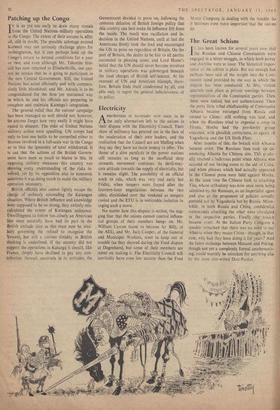The Great Schism
IT has been known for several years now that the Russian and Chinese Communists were engaged in a bitter struggle, in which both power and doctrine were at issue. The historical impor- tance of the schism is plain. But not enough has perhaps been said of the insight into the Com- munist mind provided by the way in which the dispute has been conducted. At first, violent quarrels took place at private meetings between representatives of the Communist parties. Then 1-teSe were leaked, but not authenticated. Then the potty little tribal chieftainship of Communist Albania became estranged from Russia and turned to China.: still nothing was said, and when the Russians tried to organise a coup in Tirana, Hoxha had the pro-Soviet group executed, with ghoulish correctness, as agents of Yugoslavia and the US Sixth Fleet.
After months of this, the breach with Albania became overt. The Russians then took up de- nouncing Albania for Chinese sins. This gradu- ally reached a ludicrous point when Albania was accused of not having come to the aid of Cuba, and when phrases which had actually appeared in the Chinese press were held against Ffoxha. At the same time the Chinese took to attacking Tito, whose orthodoxy was now once more being admitted by the Russians, as an imperialist agent and also as the proponent of policies actually pursued not by Yugoslavia but by Russia. Mean- while, in both Russia and China, confidential memoranda attacking the other were circulated in the respective parties. Finally the - breach became os-ert. At the Italian Party Congress a speaker remarked that there was no need to say Albania when they meant China—though, in that case, why had they been doing it for years? And the latest exchange between Moscow and Peking, though not yet a completely formal anathematis- ing, could-scarcely be mistaken for anything else by the most dim-witted Dutt-Pauker.






























 Previous page
Previous page